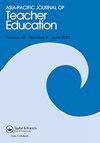Teacher education policy: part of the solution or part of the problem?
IF 1.6
3区 教育学
Q2 EDUCATION & EDUCATIONAL RESEARCH
引用次数: 5
Abstract
Education policy makers do important work, particularly in their role as law makers. They provide the legal structures within which education functions, which includes the provision of financial resources. Viewed from this angle, one might even say that policy can perform a protective function vis-à-vis education, particularly by shielding education from domination by commercial interests or ideological agendas. Policy makers and politicians are not necessarily also policy inventors. While they do have their own agendas, and often are elected on the basis of particular ideas about or even clear promises with regard to education, they operate within a complex field of diverse interests, values, and priorities. This helps to explain why policy making is never a linear process that goes straight from a “good idea” to legislation and policy implementation. It is, at best, a struggle – not unlike the struggle for the curriculum (Kliebard, 2004) – and is as much a struggle over what counts as it is a struggle over who counts, that is, over who has a voice and who has a say. The idea that the main concern of policy makers and politicians is about securing and safeguarding public goods such as education, is a key plank in the idea of the welfare state. Whereas a significant number of countries did develop this particular societal configuration, in most cases in the decades after the Second World War, all this was fundamentally changed as a result of the rise of neo-liberal forms of governance which emerged from very specific political ideologies (such as, in the UK, Thatcherism). Neo-liberalism is often characterised as the dominance of the logic of the market, where a “small state” is mainly there to provide or ensure quality control over the market provision of “public services” (note the shift from the “public good” to “public service”). In the neo-liberal set up, the state is no longer a provider of such services and is, in theory, also no longer involved in defining which services should be “on offer,” as this is mainly seen as a matter of demand (by customers) and supply (by the market). The “in theory” is important here, however, because it could be argued that the logic of giving customers what they want actually expresses a very particular political ideology which can best be characterised as populist. And it could be argued that rather than making the political case for populism, neo-liberal governments simply let the market do this work for them, often quite “successfully.” The impact of neo-liberalism on educational policy and practice has been well documented and analysed (see, e.g., Ball, 2007, 2012; Ravitch, 2011), with a significant number of authors arguing that the logic of the market – of giving customers what they want – is fundamentally incompatible with the logic of education, where there is always the question whether what the child or student ASIA-PACIFIC JOURNAL OF TEACHER EDUCATION 2021, VOL. 49, NO. 5, 467–470 https://doi.org/10.1080/1359866X.2021.1992926教师教育政策:部分解决方案还是部分问题?
教育政策制定者做着重要的工作,尤其是他们作为立法者的角色。它们提供了教育运作的法律结构,其中包括提供财政资源。从这个角度来看,人们甚至可以说,政策可以对-à-vis教育发挥保护作用,特别是保护教育不受商业利益或意识形态议程的支配。政策制定者和政治家不一定也是政策发明者。虽然他们确实有自己的议程,而且通常是根据关于教育的特定想法甚至明确承诺选出的,但他们在一个复杂的领域内运作,包括各种各样的利益、价值观和优先事项。这有助于解释为什么政策制定从来都不是一个从“好主意”直接到立法和政策实施的线性过程。这充其量是一场斗争——与课程的斗争没有什么不同(Kliebard, 2004)——这既是一场关于什么重要的斗争,也是一场关于谁重要的斗争,也就是说,关于谁有发言权和谁有发言权的斗争。政策制定者和政治家的主要关注点是确保和保障教育等公共产品的安全,这是福利国家理念的一个关键支柱。虽然有相当数量的国家确实发展了这种特殊的社会结构,在大多数情况下是在第二次世界大战后的几十年里,但由于新自由主义治理形式的兴起,这一切都从根本上改变了,这种形式源于非常具体的政治意识形态(例如,在英国,撒切尔主义)。新自由主义通常被描述为市场逻辑的主导地位,其中一个“小国家”主要是提供或确保对市场提供的“公共服务”的质量控制(注意从“公共产品”到“公共服务”的转变)。在新自由主义的框架下,国家不再是这些服务的提供者,理论上,也不再参与定义哪些服务应该“提供”,因为这主要被视为需求(由客户)和供应(由市场)的问题。然而,这里的“理论上”很重要,因为可以说,给顾客想要的东西的逻辑实际上表达了一种非常特殊的政治意识形态,这种意识形态最能被描述为民粹主义。可以说,新自由主义政府并没有在政治上为民粹主义辩护,而是让市场为他们做这件事,而且往往相当“成功”。新自由主义对教育政策和实践的影响已经得到了很好的记录和分析(参见,例如,Ball, 2007, 2012;Ravitch, 2011),有相当多的作者认为,市场的逻辑——给客户他们想要的——从根本上与教育的逻辑不相容,在教育的逻辑中,总是存在这样的问题,即孩子或学生是否应该接受教育。亚太教师教育杂志2021,VOL. 49, NO. 5。5,467 - 470 https://doi.org/10.1080/1359866X.2021.1992926
本文章由计算机程序翻译,如有差异,请以英文原文为准。
求助全文
约1分钟内获得全文
求助全文
来源期刊

Asia-Pacific Journal of Teacher Education
EDUCATION & EDUCATIONAL RESEARCH-
CiteScore
4.40
自引率
7.70%
发文量
29
期刊介绍:
This journal promotes rigorous research that makes a significant contribution to advancing knowledge in teacher education across early childhood, primary, secondary, vocational education and training, and higher education. The journal editors invite for peer review theoretically informed papers - including, but not limited to, empirically grounded research - which focus on significant issues relevant to an international audience in regards to: Teacher education (including initial teacher education and ongoing professional education) of teachers internationally; The cultural, economic, political, social and/or technological dimensions and contexts of teacher education; Change, stability, reform and resistance in (and relating to) teacher education; Improving the quality and impact of research in teacher education.
 求助内容:
求助内容: 应助结果提醒方式:
应助结果提醒方式:


